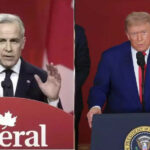This is an audio transcript of The Economics Show with Soumaya Keynes podcast episode: ‘What would Trump do on trade? With Alan Beattie’
Soumaya Keynes
We have been here before: a US presidential campaign where Donald Trump is competing with himself to sound as aggressive on trade as possible. This guy’s handing out tariffs like candy in a sweet shop with all the associated risks — tooth decay, getting a bit sick, a massive trade war with America’s allies. This week, we are going to ask what Trump would do on trade.
[MUSIC PLAYING]
This is The Economics Show with Soumaya Keynes. I’m joined here in the studio by trade supremo Alan Beattie. Alan, hello.
Alan Beattie
Hello. Thank you for having me.
Soumaya Keynes
OK. First question: on a scale of one to 10, where one is the status quo and 10 is basically full descent into autarky, zero trade, where would you put Trump’s promises?
Alan Beattie
So the thing as ever with Trump is the eccentricity as well as the extremes. So some things he says quite regularly. Sometimes he says once or twice behind closed doors. Sometimes he even writes stuff down on his website. So you’re never quite sure exactly what he’s planning. But, you know, you have to say, even on the mild stuff, relatively mild stuff, at least a five or six. On some of the crazier stuff, really, seven, eight, pushing to nine.
Soumaya Keynes
OK. All right. Well, fine. So let’s put that at a seven, then average it out. OK, follow-up question. Now, on the same scale, one to 10, what do you think is actually going to happen?
Alan Beattie
I mean, definitely somewhere between naught and 10, I would say.
Soumaya Keynes
That is really not specific enough for me, I’m afraid.
Alan Beattie
I would suspect in the end it will come out probably about a six.
Soumaya Keynes
OK. So promising seven, delivering six. Given that 10 is essentially full autarky, that’s pretty extreme. But let’s get more specific. Let’s talk tariffs, first of all. So what do we know about what he said he would do?
Alan Beattie
So one consistent thing he says he’ll do is to put tariffs of 60 per cent on China across the board and tariffs of 10 per cent on the rest of the world, though that 10 per cent sometimes becomes 20 per cent depending on who he’s talking to. Also, this one is actually on his website. There will be a reciprocal tariff act, which he describes as an eye-for-an-eye, a tariff-for-a-tariff, whatever tariff you put on the US, he puts a tariff back.
Soumaya Keynes
So specifically on cars to the EU, what would that mean?
Alan Beattie
Cars to the EU, if he has a 10 per cent tariff on cars, he would put a 10 per cent tariff on cars. Of course, this starts not to make sense because there are some cars in which the US already exerts a 25 per cent tariff. There are also some points where you really wonder, have you thought this through? If he’s really going to do an eye for an eye, a tariff for a tariff, there are some bits of US agriculture in particular who aren’t going to like this. The US protects its sugar industry with very high tariffs. Is he really going to cut those to the equivalent for, let’s say, Brazil, which might put its tariffs down and then the US will be swamped with cheap Brazilian sugar? So as with so many things, I’m not sure he’s really thought this one through.
Soumaya Keynes
So I have a question about what happens after the tariffs, because I think one motivation for this tariff, for a tariff proposal is that there’s a sense that American tariffs on average are too low. And that essentially means that America hasn’t got very much leverage when trying to negotiate with other countries. They’ve already given away lots of market access, so why should other countries lower their trade barriers? And so you might think that, you know, you would raise all these tariffs and then you would invite countries to negotiate, right? Maybe what they want is lots of mini-deals where they want the EU to come to them and say, OK, how can we get down these car tariffs? What do you need? Or countries like India that has relatively high tariffs? How likely do you think it is that there’ll be that kind of multi-negotiation thing going on?
Alan Beattie
I think it’s very likely. And we know that because it happened in the first administration as well. One of the tariffs that Trump put on was tariffs on steel and aluminium, which were essentially placed on all trading partners. The rationale was national security. If you really think that relying on foreign policy ally like the EU for steel threatens your national security, you’re slightly detached from reality. But the response of trading partners was basically to try and negotiate their way out of it. They said, OK, well, why don’t you do a quota instead of a tariff? Is there anything else we can give you? And in general, yes, they absolutely go into negotiation. Now, Trump is kind of vulnerable to this because as a business person, he just likes the idea of selling stuff. And he was, if I may say so, done up like a kipper by two of the big trading partners, China and the EU. China said, OK, we’ll do a deal with you. They called it a first phase deal where we’ll buy a whole load of stuff from you like soyabeans and so forth and we’ll do more fundamental changes in return for you holding off with some tariffs.
The EU one, I think, was even more blatant that Trump was threatening car tariffs. And Jean-Claude Juncker, who was then the European Commission president, went across to Washington in 2018, summer of 2018, and offered Trump an entirely, almost entirely nonsensical deal where he said, we’re going to buy lots of soyabeans and liquefied natural gas from you. Trump was apparently unaware that the European Commission does not, in fact, have billions of dollars of budgets to buy these sorts of things and completely fell for this. And certainly in the case of China, very few, if any, of these purchases materialised. So the question is, can you do that trick again? Will he fall for it again? And who knows? Certainly it’s true, according to what EU officials have told my colleagues in Brussels, that the EU is planning that again. They are planning to offer him a bunch of purchases. Does he fall for it again? Who knows?
Soumaya Keynes
OK. I have another question, which is about, I guess, the motivation for these tariffs, right? Because at this point, you have a fairly large US budget deficit. I think the idea is that he wants some tax cuts. And the idea is that these tariffs would offset that and could help to make the fiscal position more sustainable. What do you make of that?
Alan Beattie
Again, you’d have no idea what he is actually going to do. I mean, another of his ideas, which he floated in, behind closed doors with Republican lawmakers, is that he would eliminate the income tax altogether and replace all of that revenue with tariffs. That is a literally impossible thing to do in the sense if you raise tariffs that high, you wouldn’t actually get any imports. But it’s certainly true that he thinks you can get a lot of revenue in from tariffs to replace income taxes. I think he’s not calculated how, you know, companies would react and actually wouldn’t get as much out of it as he think. And of course, it would also be bad for the economy.
Soumaya Keynes
OK. My next question is, do you think that he would actually have the authority to do everything that he’s promised?
Alan Beattie
So I’ve seen some optimistic things saying he wouldn’t, in particular, by my longstanding contact, Alan Wolff, now at the Peterson Institute, who says that, yes, he could do the stuff on China through an authorisation called Section 301 which enables you to retaliate if you think trading partners are behaving unfairly.
Soumaya Keynes
And that’s what he used last time.
Alan Beattie
That’s exactly what he used last time. He can, of course, keep the national security tariffs, which are under Section 232, if anyone’s taking notes. Alan’s view is that he would find it much harder to do an across-the-board tariff because he wouldn’t be able to find a justification for that. There are various emergency measures that you can use in wartime or quasi-wartime. But Alan’s view is that those wouldn’t work and that the Supreme Court would essentially say, you exceed your authority, bearing in mind that Congress’s power to regulate commerce with foreign nations is right there in Article One of the Constitution.
Soumaya Keynes
OK. But that’s the other Alan’s view. What’s this Alan’s view? What’s your view?
Alan Beattie
So it really goes against the grain to disagree with another trade Alan, especially one I respect so much. But I think honestly, if Donald Trump is elected, then the authority to raise tariffs is one of the lesser things we’re going to be worrying about. This is a man who really does seem to want to dismantle lots of US democracy. You know, you’re electing an authoritarian. Part of his campaign will be, I am going to use tariffs like this. I think it’s going to be a brave Supreme Court that stands in his way. And based on what I saw during the first four years and how things have shifted since, I’m not really relying on the checks and balances to stop him doing this.
Soumaya Keynes
Right. So yeah, practically, I suppose, he would announce, maybe implement these tariffs. There would be, you know, business people who would sue, but then it would get escalated to the Supreme Court. And they may not side with the business interests. If that doesn’t work, if the legal checks and balances don’t work, is there anything else that you think could stop him?
Alan Beattie
Well, on the political side, it would seem that his tariffs during his first term, although they weren’t good for the economy, were good for his popularity in the areas that were supposedly protected by them. There’s a particular paper that argues that. I think this kind of across-the-board tariffs is in a somewhat different world. If it really does push consumer prices up, you know, that’s a moot point. If it does push consumer prices up, it will eat directly into household incomes. And this is a point that the Kamala Harris campaign has gone in hard on. And this is a point at which her trade policy definitely diverges from that of Donald Trump. There’s a longstanding view that Joe Biden has been continuity Trump. But both he and Kamala Harris have attacked this as a kind of national sales tax.
And, you know, there are estimates that have been done, and again, from people from the Peterson Institute, suggesting that if the 20 per cent and 60 per cent tariff were put through and that’s what went on to consumer prices or that generally went on to consumer prices, that would reduce the after-tax income for the average household, the median household, by 4 per cent, by more than $2600. That’s quite a lot of money. And given that inflation has been such a big issue over the last few years because of the big surge in global inflation, that’s likely, I think, to affect him in a way that tariffs haven’t in the first term, which were mainly about specific industries. But again, I think so much of his appeal is not necessarily appealing to economic rationality so much as just sort of the feeling that we need to stick it to the foreigners. I’m not sure that that’s really going to constrain him.
Soumaya Keynes
Do you think that there’s a kind of tension in the narrative here? Because on the one hand, we’ve got people warning that these tariffs would raise prices. On the other hand, the point is that this is a tax increase, right? And overall, we tend to think that tax increases, at least in the medium term, will reduce demand and would reduce inflation. Do you think that people have that straight?
Alan Beattie
I mean, you know, the sequence would presumably be this goes through on to consumer prices. If the Federal Reserve believes that’s going to get incorporated into general inflation, they will have to raise interest rates and that will slow the economy. Whether or not voters have really made that sort of, got that narrative in their minds, I don’t know. But to be honest, I kind of think that just an immediate hit on prices is going to be enough to worry quite a lot of voters, whether or not they make the connections with what happens down the line.
Soumaya Keynes
OK. Well, let’s dive a bit deeper into the effects of these tariffs. So can we just do a bit of Incidence 101, right? Because you put on a tariff and there’s lots of different things that can happen, right? It could be that the foreign exporter lowers their prices to retain access to the US market. It could be that the importing company eats the tariffs so they would see lower profits. Or it could be that actually these tariffs are passed on to consumer prices.
My understanding of the evidence from last time is that actually it wasn’t the case that exporters lowered their prices mostly, right? But then there was this question of, OK, well, is it the importer eating this or is it the consumer? And there I thought the evidence was just a bit hazier or a bit more mixed. What’s your read?
Alan Beattie
It is absolutely right. It was pretty clear that exporters did not reduce their prices. Depending on which paper you look at, some of it was squeezed into margins, squeezed by margins, and some of it went into consumer prices. Now, what happens next time, it may not be the same. And in particular, it kind of depends what goods you’re looking at. So if you are exporting a good, let’s say, electric vehicles, which is a new good, a new type of good, you’re trying to establish market share in the market you’re exporting to, particularly in EVs. China has cheap EVs, which they’re hoping to get into the US market because they will undercut American-built EVs. Then what you might do, might well do, is the first of those, you might actually reduce your export prices, either because your margins, your own margins are fat enough that you can take a hit or that you would take a loss there or lower margins there and, you know, make up for it elsewhere. So it is quite possible that the thing that definitely didn’t happen in the first instance, the first round of tariffs, will happen in the second round. This has varied a lot across countries and across time.
Soumaya Keynes
And I guess there’s a kind of exchange rate effect. If you’ve got such a broad tariff, then who knows what the exchange rate would do?
Alan Beattie
That’s right. I mean, theory tells you the exchange rate will move to offset the tariff, in this case to appreciate. But, you know, there’s some evidence that that has happened. But again, it tends to vary over time.
Soumaya Keynes
OK. So I want to ask a bit more about this foreign retaliation. You said that colleagues have been hearing from the European Commission that they’re preparing, they’re ready to try to negotiate their way out of this, but also, presumably folks would hit back. Right?
Alan Beattie
So one thing the EU has, a weapon the EU has created since the first Trump administration, in fact, they originally created it in response to Trump threatening various tariffs against them, is a thing called the anti-coercion instrument. This is kind of new and it’s innovative and it relies on quite a general principle of law, which is that if a trading partner is using their tariffs or investment or any other form of trade to try and coerce you into doing something, to coerce you into changing your domestic policies, then you can retaliate or indeed take quite a wide range of trade or investment or actions back on those.
This is legally quite risky. It’s never been tested. As I say, it depends on, it relies on the general principle of public international law. It’s obviously quite an explosive thing to do as well. If you say this is not just, you know, we think, your retaliation, we are making a political judgment that you are trying to coerce us and that therefore we’re going to hit back with things which are not directly related to what you’re doing.
They’re just designed to have a sort of political resistance to coercion. The one time this was seriously contemplated was when China suddenly blocked exports from Lithuania, which they did because Lithuania accorded a degree of respect to Taiwan, Taiwanese diplomats that they did not agree with. And so suddenly it became administratively impossible to do so. In the end, they didn’t actually use this, not least because they didn’t really need to. Lithuania is such a small country. The EU itself and other destinations could absorb Lithuanian exports. But that was exactly the kind of situation in which they could have used the ACI. And Trump trying to push Europe into doing things it doesn’t want to do and doesn’t think that it has to do would be an obvious case for using it.
Soumaya Keynes
But what do you think would be a specific example of something that the EU could do using this anti-coercion instrument? How could they make it hurt for the US?
Alan Beattie
Oh, they can use all sorts of retaliations. They can use all sorts of things on tariffs. They could block investment. They actually have given them quite a wide leeway to do it. One thing about the ACI, though, is that when it was created, the member states of the EU were quite worried that the European Commission, you know, the central executive was going to use it quite recklessly and get them into a lot of trouble with China or the US. And of course it’s the member states who are trying to export to China and the US, get investment in and so forth. So they designed it that the member states have a big say in whether it’s used or not. So there’s quite a big hurdle to use it. And once you do use it, there’ll be quite a big scramble, I think, over exactly what measures they do use.
Soumaya Keynes
OK. Well, one final question before we throw to a break, which is about whether you think that there was any shift from last time in terms of the approach to trade. And here I’m really thinking about last time there was this real emphasis on bilateral trade deficits. But if you read the writing of Robert Lighthizer, the former United States trade representative who many are predicting would have a role in a next Trump administration. You know, he says that actually it’s the overall trade deficit that matters, right? So he looks at Europe. They have an overall trade surplus. China also has an overall trade surplus. He looks at the huge trade deficit of the US. And, you know, the trade measures are supposed to target those things rather than kind of specific products. Have you picked up that shift and how do you think it could matter?
Alan Beattie
Yes, and I think this is one occasion where economists and trade lawyers often just differ enormously. There is a belief among people who spend their whole lives specifically in trade and trade law that you can fix trade deficits and current account deficits with trade policy specifically. That’s not something that is shared by most economists who say that trade restrictions and trade policy may shift the deficit around, but what actually changes deficits and surpluses is macroeconomic policy. So savings and investments and sometimes currencies.
So if they do try, really try and do this, the one way of getting your trade deficit down is, of course, to have a crunching recession because then you aren’t importing as much. So if they are going to, you know, ratchet up trade policy more and more, you’re sure they might get a reduction in the trade deficit, but not for good reasons. Otherwise, I just think they’re going to be playing whack-a-mole trying to stop the deficit popping up in one place where they’ve suppressed it in another.
Soumaya Keynes
OK. Well, let’s go to a break. And when we get back, I’m going to ask about what he might do aside from tariffs.
[MUSIC PLAYING]
[BEHIND THE MONEY TRAILER PLAYING]
Soumaya Keynes
We are back from the break. So, Alan, let’s go beyond tariffs. There are obviously quite a few other things that he could do. But first of all, and let’s maybe keep this quite brief, can I ask you about the US approach to the multilateral trading system, the World Trade Organization? How likely is it that Trump and his team would decide that actually it’s a wonderful, glorious institution and should be supported and nurtured?
Alan Beattie
It is more likely that I am made the next director-general of the WTO than that happens. He will emphatically not do that. The only direction he’ll go in is actually totally crippling the institution, refusing to participate and indeed blocking negotiations, actually refusing to pay the financial dues. You know, Robert Lighthizer has a longstanding animus against the WTO, not least because it rejected him as a member of the appellate body. No, I don’t see any softening there at all.
Soumaya Keynes
Just a point that I would enjoy it if you became the next director-general of the World Trade Organization.
Alan Beattie
All journalists would enjoy it, but anyone actually involved in trade would greet it with horror.
Soumaya Keynes
Fair enough. OK, so now let’s talk about other policies. So export control policies. What do you think the outlook is there?
Alan Beattie
So the export control regime has been developed and tightened. And the Biden administration has used it quite extensively, you know, under at least a stated philosophy of the small yard, high fence, which is they are very tough in protecting technologies they consider important, but they try and restrict those, a number of technologies to that which is absolutely essential. This is one point at which Trump’s eccentricity comes in. You can imagine him actually just putting stuff on the export list because some company has got his ear or has done a donation or he just likes the idea of it.
Similarly, you could imagine him taking it off for exactly the same reasons. So, you know, this is a very powerful tool. It’s in the hands of the administration and you have literally no idea which way it could go. And again, given that the export destinations of most of these controlled things are the likes of China and Russia, well, he’s already said he’s a pretty big fan of Vladimir Putin. We know he likes doing deals with strongmen. We know he likes getting the better of strongmen. He said positive things about Xi Jinping. You can imagine them bamboozling him into some sort of deal. And part of that would be he actually relaxes controls on technology, not tightens them.
Soumaya Keynes
What about the entity list? So this is restrictions on which foreign companies that you can deal with as an American.
Alan Beattie
I just think it’s more erratic, that’s the point, simply because those companies will have contacts, those companies will have someone’s ear, either in the Chinese administration or in the Trump administration, and decisions will be taken on the basis of short-term expediency, not on any sort of, you know, rational basis. As an example of just how much Trump can shift, you can look at TikTok. So when he was president, he was very tough on TikTok. He tried to ban it completely or forced its parent company to divest. That’s something that went into the courts.
And yet suddenly in the last few months, he’s done this about turn on TikTok. Suddenly TikTok is great. We presume that’s because TikTok is a competitor of Facebook and he’s now against Facebook. And suddenly in June he joined TikTok for the first time. So there’s an absolute complete reversal based on short-term political considerations. Would he do that again? Yes, absolutely.
Soumaya Keynes
So it feels like recently in the US, there’s been a kind of spread of the kind of thing that there would be restrictions on trading, right? We’re really not just talking about goods. We’re talking about technologies. We’re talking about people in some cases. Do you think that trend is here to stay?
Alan Beattie
So going back to what we were saying about cars, if you look at the Biden administration, the Biden administration is not just concerned for, you know, trade mercantilist reasons about Chinese EVs coming in, which is why they put 100 per cent tariffs on them. They’re also concerned about the security implications of having a whole bunch of cars made in a hostile country driving around America collecting data. You know, President Biden has referred to EVs as smartphones on wheels. And now if you truly believe that and that essentially means we cannot have any data-heavy goods and particularly cars in the US, that has really quite serious implications for what you’re doing not just on tariffs, but on security.
As an example, you know, the US has an integrated car supply chain with Mexico and Canada through the USMCA trade deal. Mexico has been welcoming in Chinese electric-vehicle manufacturers. Now, you know, because Mexico is sort of part of that trading area, in theory there’s nothing to stop these Chinese manufacturers from making things in Mexico as long as they’re made with imports from Mexico and exporting them into the US. If you think this is a security problem, then you’re going to start to have to take a lot more actions, not just trade actions, but security actions to stop that happening.
And it’s notable that, for example, the administration recently bullied — I think that’s exactly the right word — bullied Canada into putting very high tariffs on Chinese cars to stop them coming into Canada. Now, Trump’s position on this is ambiguous. So he has said several times, I’ve got no problem with Chinese manufacturers coming in as long as they employ Americans. So that’s the mercantilist in him. And that would actually replicate what’s happened in the US in the past. So back in the ‘70s and ‘80s, when there’s a competitive threat from Japanese motorbikes and cars, there were some severe restrictions put on imports. The Japanese company responded by what’s known as tariff-jumping, simply setting up in the US, I think Honda was the first to set up in Ohio in 1979, 1980. And now there are Japanese car companies and indeed other foreign car companies all over the US.
But if you believe that anything made by a Chinese company is dangerous, you’re not going to allow that. That’s going to be not entirely straightforward to stop because you don’t necessarily have the powers to do it. And so that will be something, if Trump is elected, where he’s going to have to weigh his visceral dislike of foreign stuff coming in, or at least things made by foreign companies, and his distrust of China with the advantage that these will be good jobs that are created in America.
Soumaya Keynes
Can I ask about subsidies? So obviously, under the Biden administration, we’ve seen the Inflation Reduction Act, we’ve seen the Chips Act, lots and lots of money swilling around, you know, dangers about some of that being trade distorting. What do you think is going to happen there?
Alan Beattie
I mean, clearly Trump is not going to be bothered with the trade distorting, but he has said in the past that he doesn’t like the IRA. He’ll stop the IRA. And, you know, I think that’s simply because it’s government spending and it’s not government spending necessary to his favoured people, ie., the rich. So if he does try and stop it, now I think that is one area where Congress might actually push back. You know, some of this spending was actually designed to go into Republican districts for that reason. And, you know, Congress likes tax cuts, but they also like spending as well. So how easy he will find to do that is probably less easy than tariffs.
And some of this spending, the tax credits in particular, are designed essentially just to keep rolling and rolling until they’re stopped. So there would have to be an explicit decision to stop them. For that reason, and because Trump has never showed himself particularly concerned with the fiscal position before, I think it’s actually less likely that that will happen, that spending will be cut. I think certainly for the next few years, the expectation is that that spending will continue.
Soumaya Keynes
And what about sanctions? That’s obviously an area that has risen in importance since Russia’s invasion of Ukraine but was an issue before Iran. That sort of thing.
Alan Beattie
So obviously I’m getting very repetitive here by saying he’s so eccentric that you have no idea what he might do, but he’s certainly discovered the power of the dollar and the power of the dollar in the global payment system and just the plumbing of the world economy. I think recently he made this extraordinary comment that countries that stopped using the dollar would be punished. I presume he’s talking there about the fact that some small amounts of bilateral trade, certainly including Russia, for example, have been conducted in local currencies to avoid dollar sanctions. But he’s clearly aware that the dollar is a powerful instrument, which indeed it is. The dollar is a very powerful instrument. And cutting people out of the dollar payment system is quite dramatic. So you can absolutely imagine him using that, you know, on quite a light trigger, on anyone and anything that’s incurred his ire.
Soumaya Keynes
OK, well, I’ll be watching that space. Final question. Do you think we will see any new trade deals? And I don’t mean, you know, mini-trade deals to get out of a universal tariff. I don’t mean the kind of mini-managed trade deal. I mean, like USMCA Mark II.
Alan Beattie
I find that hard to imagine not just or even not necessarily because of Trump himself, but just because the whole idea of trade deals is so absolutely poisonous in Washington. You know, the Biden administration obviously just said we’re not going to do any more trade deals. In order to give the effect that they were or to give the impression that they were concerned with the Asia-Pacific, they created this thing called the Indo-Pacific Economic Framework, which is basically trade deals without any trade in them. They’re more like a re-enactment society than they were an actual trade deal. And most countries in Asia-Pacific treated them with something close to contempt. And the whole thing has largely come to nothing, nothing substantive, not least because the administration pulled all the data and digital parts out of it suddenly.
So just on Capitol Hill, the idea seems to be there that signing a trade deal, any trade deal is dangerous. They allowed Trump to renegotiate Nafta. I’m just looking around the world and I’m finding it hard to imagine them signing any substantive trade deal with anywhere else.
Soumaya Keynes
Would a second Trump term make your job much more interesting?
Alan Beattie
Interesting. Terrifying. Who knows? But yes, I think it’s the extent to which we are just in absolutely uncharted waters. There’s a sense that, there’s a well-known saying that Biden is continuity Trump and basically carried on the same way. But, you know, you knew which way he was going. He was using tariffs in a sort of strategic way to protect certain industries. He was using iron and steel tariffs to try and gin up political support in certain key states. So, but they, you know, they have more or less charted a straight course on the way they’re going. Trump is now veering off to the part of the map marked “here be dragons”. We will all end up in places we have not been before. Interesting, yes. And terrifying as well.
Soumaya Keynes
OK. Well, let’s end that there. That is all for this week. Thank you so much, Alan.
Alan Beattie
Thank you very much.
[MUSIC PLAYING]
Soumaya Keynes
You have been listening to The Economics Show with Soumaya Keynes. If you enjoyed the show, I would love it if you could rate and review us wherever you listen. This episode was produced by Edith Rousselot, with original music from Breen Turner. It is edited by Bryant Urstad. Our executive producer as Manuela Saragosa. Cheryl Brumley is the FT’s global head of audio. I’m Soumaya Keynes. Thanks for listening.





